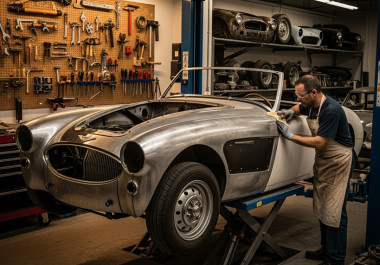The first thing that hits you at a car auction isn't the smell of petrol or the sight of the cars. It's the voice. That fast, rhythmic chant that sounds like a language all its own. That’s the auctioneer, the person in the middle of the storm, running the whole show. But what exactly are they doing?
A lot of people just see a fast-talker. But anyone who's spent time in this business knows they’re much more than that. A good auctioneer is part referee, part showman, and part mind-reader. They're the guardians of the process, making sure every sale at a place like RAW2K is fair, clear, and moves along at the right speed. If you want to succeed, whether buying or selling, you need to understand their game.
The Gavel and the Contract: It's More Than Just Noise
The most important part of an auctioneer's job is the legal bit. When they shout "Sold!" and that hammer cracks down, it's not just for dramatic effect. In that instant, a legally binding contract is created between the winning bidder and the seller.
The auctioneer is like a ship's captain. The bidders are the crew, all working to move the sale forward. The captain has to see and hear everything, from a big shout at the front to a quiet nod at the back. When they bring that hammer down, they're officially docking the ship. The deal is done, and there’s no turning back. That’s why they’re so careful. Their reputation, and the auction house's, is on the line with every lot.
Controlling the Floor: The Art of Pace and Psychology
Putting the legal duties aside, a great auctioneer has a gut feeling for a room. They're experts at reading people, spotting a moment's doubt or a flash of real interest.
Spotting the Bids
In a packed hall, bids come from everywhere. A clear wave of a paddle, a quick nod, a finger lifted off a catalogue, the auctioneer has to catch it all. They have "spotters" on the floor acting as their eyes and ears, but the final decision always rests with the person on the podium.
In our online vehicle auctions, technology does a similar job. Clicks are the bids, and the software logs them with a timestamp. The idea is identical: the system has to be bulletproof so every bid is registered in the right order.
Setting the Tempo
That famous auction chant isn't just for show; it's a tool for building momentum. A quick, energetic pace creates urgency, nudging people to bid fast. If the bidding starts to drag, you'll hear a change in tactics. They'll slow down, draw out the numbers, and ask, “Are we all done at £5,200?” It’s a way of giving hesitant bidders one last chance to jump in. It’s a fine line to walk between stirring up excitement and giving people enough space to think.
The Reserve Price: The Auctioneer's Secret
One of the trickiest parts of the job involves something the bidders can't see: the seller's reserve price. This is the secret minimum a seller is willing to take.
This is where you see real skill. The auctioneer has to push the bidding towards that hidden number without giving it away. You might hear them say something like, “It’s on the market and we are selling!” That’s the code. It means the reserve has been hit, and the car is going to the highest bidder, no matter what. If the bidding fizzles out just below the reserve, say at £4,800, when the reserve is £5,000, the auctioneer will call it a "provisional sale." This means they might try to cut a deal between the top bidder and the seller afterwards, a job that needs a negotiator's touch.
A Duty of Honesty: Announcing the Details
For all the showmanship, a key part of the auctioneer's job is being straight with people. Even though cars are sold "as seen," the auctioneer has to announce any important information or known faults that the seller has provided. They’ll clearly state the key facts, telling you it’s a "2018 model with 75,000 warranted miles," or pointing out a "large scratch on the passenger door."
They must also declare if a "vehicle is a Category S." This announcement is vital. It ensures every bidder knows the score before they commit. If an auctioneer fails to mention a major detail like a salvage category, the sale could be cancelled. It's why on our car auctions, we make sure all this information is laid out clearly from the start.
How a Great Auctioneer Makes the Difference
The impact of a skilled auctioneer is massive. Take a sale for a beautiful, but niche, 1978 Triumph Bonneville motorcycle. The first auctioneer to handle it was flat. He mumbled the description and made no effort to connect with the bidders. The bidding started at £2,000 and died out at £2,800, miles off the reserve. It didn't sell.
An hour later, a different auctioneer stepped up. This one had some spark. He knew his bikes and started with a quick story about the model, pointing out its rare original parts. His energy was infectious. He got the bidding going again at £2,000, and this time, it took off. He worked the room, made eye contact, cracked a few jokes, and built a bit of a rivalry. The bike sold for £4,500. Same motorcycle, same bidders. That's the difference a good auctioneer makes.
From the Podium to the Platform: The Online Process
So how does this work online, without a person on a podium? Technology handles many of the same jobs. The timer is the online version of the auctioneer's chant, creating a clear deadline. The system sets the next logical bid, say, £50 jumps on a car under £2,00,0 which keeps things moving smoothly. Many sites also use a system where a last-second bid adds another minute or two to the clock. This prevents "sniping" and gives everyone a fair final chance, just like a live auctioneer would.
Even online, people are still involved. Behind the scenes at RAW2K, our team monitors the sales, ready to handle disputes, check high-value bids, or look into strange bidding patterns. They make sure the system runs with the same integrity as a live event. If you ever have a question, you can always get in touch with that team.
Final Thoughts: The Heartbeat of the Sale
An auctioneer is much more than a fast-talker. They're the referee, the legal authority, and the entertainer who makes it all happen. They get a fair deal for the seller by aiming for the best price, and they protect the buyer by keeping the sale transparent and orderly.
The next time you're at an auction, listen to the rhythm. You’ll realise it’s not chaos at all. It’s a carefully managed event, and the auctioneer is the one pulling all the strings. Understanding their role will make you a much smarter bidder.




